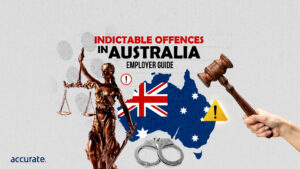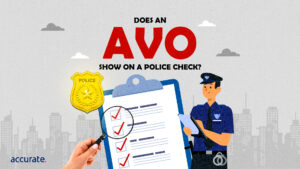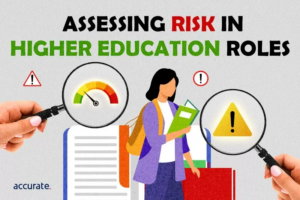Securing Your Team with Comprehensive Background Checks
Fast Reliable Police Checks
As an accredited body with the Australian Criminal Intelligence Commission (ACIC), VerifyNow trading as Accurate Background in Australia is authorised to submit checks on behalf of organisations to assist these organisations (Legal Entity Customers) with the screening of their employees.
A police check, if from the ACIC is also known as a Nationally Coordinated Criminal History Check, is a certificate that provides the Disclosable Court Outcomes (DCO) and any pending charges that are associated with an individual’s name. By legislation, national police checks are required for certain positions, both paid and voluntary.
The DCOs shown by an Australian police check include but are not limited to:
- Any charge found proven in court;
- Details of the court that heard the charge, the date and any penalty or sentence;
- Findings of guilt by a court, even if no conviction is recorded;
- Court convictions, even if no sentence or penalty was given;
- Good behaviour bonds and similar court orders;
- Charges laid by police but not yet proven, or otherwise, in court;
- Current investigations in which the subject is a suspect;
- Children’s Court convictions and guilty findings;
- Traffic convictions and guilty findings;
- On-the-spot fines issued by police that ended up in court.
Australian Police checks can also be obtained through the Australian Federal Police.
** Note: volunteer police checks can only be used for voluntary purposes and not for paid positions of employment. The cost for volunteer police checks is offered at a reduced price.
When Might a Police Check be Required?
There are a range of reasons that you might need to obtain an Australian police check on an individual.
Most commonly, police checks are obtained as part of the pre-employment screening process that employers carry out in order to assess the risk of taking on individuals as staff.
Additionally, police checks are needed to maintain safe environments for those who may be considered to be vulnerable, such as children, the elderly and those with disabilities.
The following are scenarios where a police check will be required:
- For employment where individuals are working with vulnerable groups. For example, childcare and aged care work
- For licensing or registration of workers. For example, registered nurses and real estate agents
- For volunteer work
- For any government work
- For immigration
- For visa applications and overseas employment
- For adoption applications
- For firearm licensing
What Value Does an Australian Police Check Have?
An Australian police check is invaluable when hiring staff in different industries, as it lets employers manage and mitigate any immediate risk.
It’s incredibly important to protect the integrity of specific industries and those who may be considered vulnerable. By utilising police checks, the public can have more trust in companies they engage with and streamline adopting particular businesses in their business activity.
What Is the Difference Between an AFP and ACIC Check?
When looking at police checks, there are two main types in Australia:
- Australian Federal Police (AFP) Check; and
- The Nationally Coordinated Criminal History Check (or ACIC Check)
AFP Check
An AFP Check is a completely comprehensive police check and needs to be carried out for immigration or visa purposes, as well as for employment with the Commonwealth Government or for general employment screening purposes.
Nationally Coordinated Criminal History Check (or ACIC Check)
For most pre-employment screening processes, a Nationally Coordinated Criminal History Check is the appropriate and most straightforward option. The Australian Criminal Intelligence Commission (ACIC) is a government body that works with Australian police agencies and accredited bodies to provide police checks. Accurate Background is accredited with ACIC, which authorises us to submit police checks on behalf of organisations and assist in their pre-employment screening process.
Information and Identity Requirements
To apply for an AFP police check, identity documentation that fulfils a 100 point identification checklist must be provided for the individual.
At least one primary document from the following list must be provided, with the necessary number of secondary documents to meet 100 points.
| Primary Documents | Secondary Documents |
Centrelink card (with reference number) – 40 points Birth Certificate Extract Birth card (NSW Births, Deaths, Marriages issue only) – 25 points Change of name certificate (Australian Registry issue only) – 25 points |
When applying for a Nationally Coordinated Criminal History Check , identity documentation is required for identity verification purposes, however, the requirements are a little different.
Four documents need to be provided from the following three categories:
| 1x Commencement of ID document | 1x Primary Use in the Community document | 2x Secondary Use of the Community documents |
|
How Long Does It Take To Process a Police Check?
An AFP police check is generally processed within 48 hours, with fingerprinting (if required) and name checks sometimes taking up to 15 business days.
Nationally Coordinated Criminal History checks are generally processed within ten business days.
According to the ACIC, as much as 70% of Nationally Coordinated Criminal History checks are being completed in real-time and will return results to the requesting organisation within minutes.
The remaining 30% take up to ten business days as these applications identify a ‘potential match’ and require multiple police agencies to become involved, making the check more complex in nature.
These ‘potential matches’ can occur if the individual being identified shares similar details in their records with other individuals in police systems, particularly if they have a common name.
How Long is a Police Check Valid?
While there’s no validity date on police checks, employers must note that these checks are for a particular point in time.
It’s up to the hiring organisation to determine whether these records are still relevant or acceptable based on when the records were requested.
Who Will Access the Police Check?
- Authorised police staff in the police check assessment process
- Authorised ACIC or AFP staff that support police agencies and accredited bodies (like VerifyNow Pty Ltd trading as Accurate Background in Australia) to process police checks
- The authorised staff both from the accredited body or legal entity customer who have requested the police check and review the results
- Third-party as required by law or with consent of the applicant
How to Interpret a Police Check Results Certificate
When the results of a police check are received, they will come in the form of a results certificate.
The basis of the certificate will outline if there are No Disclosable Court Outcomes (NDCO) or Disclosable Court Outcomes (DCO).
NDCO means that there is:
- No police information currently held against the applicant
- No police information that can be released in a police check, and the application of relevant spent convictions legislation and/or release policies
DCO means that there is:
- Police information that can be released
What Is Included in a DCO?
The following are examples of what is included in a DCO; however, it is not an exhaustive list.
- Any charge found proven in court
- Details of the court that heard the charge, the date and any penalty or sentence
- Findings of guilt by a court, even if no conviction is recorded
- Court convictions, even if no sentence or penalty was given
- Good behaviour bonds and similar court orders
- Charges laid by police but not yet proven, or otherwise, in court
- Current investigations in which the subject is a suspect
- Children’s Court convictions and guilty findings
- Traffic convictions and guilty findings
- On-the-spot fines issued by police that ended up in court
A sample Nationally Coordinated Criminal History Check results certificate or AFP National Police Check certificate can be provided upon request.
What You Need to Know About Criminal Record Discrimination
Whilst conducting a police check and gathering information on candidate’s criminal record can be invaluable in hiring decisions, it’s important to remember that under Australian discrimination laws, it’s prohibited to discriminate against an individual on the basis of their criminal record when their previous offences are not relevant to the job.
There are some crimes that will automatically disqualify individuals from working in certain areas for the rest of their life, for example, working with children. However, there are cases where someone’s criminal record would not prevent them from fulfilling the requirements of a role.
Simply put, this means that whilst there is no obligation for employers to employ people, there’s an obligation to treat people fairly whilst recruiting.

Do you need help?
Need employment background screening but don’t know where to start? Organise a chat to see how employment screening can benefit your organisation.

Not sure which background checks to choose?
Businesses face challenges recruiting and retaining employees in today’s fast-paced world. Employees can be the greatest asset or the biggest risk of a business. Employment screening can help increase workforce integrity and trustworthiness. Let’s have a conversation so we can better understand your employment screening requirements.
Related Resources

Keep Up To Date!
Stay connected and up to date by subscribing to our newsletter. Get access to industry insights, our latest blogs, events and more.






